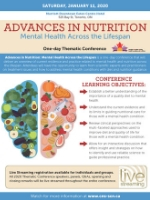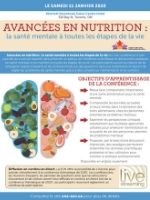|
SATURDAY, JANUARY 11, 2020
|
|
7:30 am - 8:30 am |
Breakfast and engagement with posters and sponsors |
|
8:30 am - 8:40 am |
Introductions and Objectives
Speakers: Guylaine Ferland, PhD and Heather Keller, RD, PhD, FDC, FCAHS |
|
SEGMENT ONE - Nutrition in the First 20 Years
Moderator: Alison M. Duncan, PhD, RD
|
|
8:40 am - 9:30 am |
The Mental Health Legacy of Early Childhood Malnutrition: A 45 Year Longitudinal Study
Speaker: Janina R. Galler, M.D., Professor of Psychiatry, Harvard Medical School
Senior Researcher, Division of Pediatric Gastroenterology and Nutrition, MassGeneral Hospital for Children
expand abstract and bio +/-
Description:
Malnutrition impacts up to 34% of all children under five years of age world-wide. Stunting and inadequate nutrition severely restrict the developmental potential of these children. However, long-term studies of the effects of early childhood malnutrition are limited. The Barbados Nutrition Study is a unique 50+ year longitudinal study that has documented the effects of early malnutrition on mental health over the life span and across generations. The study examines the effects of malnutrition limited to the first year of life on behavioral and cognitive outcomes of adult survivors and their children. A major finding has been the increased prevalence of attentional problems that continue into middle adulthood and are also present in the next generation, impacting offspring who were never malnourished themselves. These findings are closely associated with epigenetic changes in both generations. A recent and unanticipated finding is the increased prevalence of mild cognitive impairment in adult survivors of early malnutrition at 45-51 years of age.
Learning Objectives:
-
To discuss the impact of childhood adversity during critical periods of brain development from the 2nd trimester of life to 2 years of age;
-
To report effects on mental health outcomes over the lifespan;
-
To present epigenetic findings that may serve as a mechanism for the long-term effects of childhood malnutrition.
About the speaker:
 Janina R. Galler, MD, is Professor of Psychiatry at Harvard Medical School and a Senior Researcher, Division of Pediatric Gastroenterology and Nutrition, MassGeneral Hospital for Children, Boston, MA. She is a summa cum laude graduate of the Sophie Newcomb College of Tulane University, and she received her MD from the Albert Einstein College of Medicine. Dr. Galler completed her residency training in Psychiatry and Child Psychiatry at the Massachusetts General Hospital, Boston and the Boston University School of Medicine. Janina R. Galler, MD, is Professor of Psychiatry at Harvard Medical School and a Senior Researcher, Division of Pediatric Gastroenterology and Nutrition, MassGeneral Hospital for Children, Boston, MA. She is a summa cum laude graduate of the Sophie Newcomb College of Tulane University, and she received her MD from the Albert Einstein College of Medicine. Dr. Galler completed her residency training in Psychiatry and Child Psychiatry at the Massachusetts General Hospital, Boston and the Boston University School of Medicine.
Dr. Galler's long-standing research interest has centered on malnutrition in early life and its long-term effects on mental health and brain development over the lifespan and across generations. She is the founding Director of the Barbados Nutrition Study, a 45+ year longitudinal study that has followed the children with histories of malnutrition, their offspring and grandchildren. She also conducts translational research in animal models of prenatal and intergenerational malnutrition. An exciting new facet of her translational research involves the study of epigenetics. Epigenetic mechanisms offer an intriguing explanation of our earlier findings and provide a powerful new tool to identify potential intergenerational mechanisms of early life malnutrition and associated behavioral and mental outcomes conditions.
Dr. Galler was the first Joseph P. Kennedy Foundation Public Policy Fellow, and she served as a US Senate Fellow and chairperson of the Eunice K. Shriver National Institutes of Child Health and Development (NICHD) Advisory Council. She was also awarded the Blanche F. Ittleson Award for Research in Child Psychiatry from the American Psychiatric Association, the Irving B. Harris Award from the Society of Behavioral Pediatrics, the Newcomb Centennial Award from Tulane University. She was the first woman to be awarded the international Leon Eisenberg Award for leadership in mental health, developmental disabilities and research ethics by Boston Children’s Hospital and Harvard Medical School. Dr. Galler is the author of over 180 peer-reviewed publications and two books on Nutrition and Behavior.
|
|
9:30 am - 10:10 am |
Myths and Truths about eating disorder care and support: Getting to know the person, getting to know the disorder
Speaker: Shawna Melbourn B.Sc., AHN, Registered Dietitian, CEDRD-S
Certified Intuitive Eating Counselor, Anchor Psychological Services
expand abstract and bio +/-
Description:
Almost a million Canadians at any one time can meet the diagnostic criteria for an eating disorder. This statistic doesn't even begin to capture the gravity of this widespread illness. Given that disordered eating has been normalized in our culture, it can be tricky for individuals and healthcare providers to understand how this mental health illness presents itself, how a person is affected, and why it is challenging to detect, support, and address eating disorders. These myths can lead to stigma and shut the door for individuals to receive the treatment they deserve.
During this short presentation, you will learn:
-
Some of the common misconceptions around eating disorders and how a person may experience their illness;
-
What an eating disorder is and what it is not, going beyond the diagnostic criteria;
-
Barriers that both healthcare providers and individuals experience in the face of an eating disorder/disordered eating when seeking treatment;
-
The nature of the eating disorder to help you feel more prepared and betterequipped for supporting your client or patient
 About the Speaker: About the Speaker:
Shawna Melbourn is a Registered Dietitian (RD), a Certified Eating Disorder Registered Dietitian and an Approved Supervisor with the International Association of Eating Disorder Professionals (CEDRD-S) and is a Certified Intuitive Eating Counselor. Shawna is committed to working closely with individuals and families affected by eating disorders, disordered eating and other eating challenges to navigate the sea of nutritional trends and gain confidence with eating and nutrition.
Over her fifteen years of practice, Shawna has worked in a variety of settings including being the treatment team dietitian for the Eating Disorder Program at the Children’s Hospital of Eastern Ontario. Shawna is a non-diet dietitian and adopts strategies from all her areas of nutrition expertise to help clients find freedom from eating disorders, body image and the backlash of chronic dieting. Shawna offers a well-rounded approach to eating disorder treatment. She has presented at national conferences, schools, and universities about nutrition therapy for eating disorders, body image, Intuitive Eating practices, and finding peace with food.
She graduated from Mount Saint Vincent University in Halifax, Nova Scotia with a degree in Applied Human Nutrition in 2005 and has since been member of Dietitians of Canada and the College of Dietitians of Ontario. Shawna is also a proud member of IAEDP, EDAC and IFEDD.
|
|
10:10 am - 10:30 am |
Speaker Q & A |
|
10:30 am - 10:50 am |
Break |
|
SEGMENT TWO - Addictions
Moderator: Rupinder Dhaliwal, RD, FDC
|
|
10:50 am - 11:30 am |
Nutritional Implications of Medical Marijuana
Speaker: Dr. Robert L. Tanguay
BSc (Hons), MD, FRCPC, CISAM, CCSAM
Provincial Medical Lead, Opioid Dependency Training, Alberta Health Services
expand abstract and bio +/-
Description:
Learning Objectives:
-
Review of the constituents of Cannabis;
-
Review of the Endocannabinoid System;
-
Cannabis and the Brain;
-
Cannabis and Pain;
-
Other Side Effects of Cannabis;
-
What can I do, a Practical Approach.
About the speaker:
 Dr. Rob Tanguay is an FRCPC psychiatrist who is fellowship trained and sub-specialized in both Dr. Rob Tanguay is an FRCPC psychiatrist who is fellowship trained and sub-specialized in both
Addiction Medicine, certified under the International Society of Addiction’s Medicine (ISAM)
and Canadian Society of Addiction’s Medicine (CSAM), and Pain Medicine. He is the Provincial
Medical Lead for Opioid Dependency Treatment Training for Addictions and Mental Health, Alberta
Health Services, the Executive Director of the Canadian Opioid Deprescibing Institute
(CODi), the Executive Director of the Transitional Outpatient Patient Program for Pain (TOPPS),
the President Elect of the Pain Society of Alberta, the CSAM Regional Director for Alberta and
NWT, and the Co-Chair of the Opioid Use in Pain Medicine working group for the Alberta Pain
Strategy. Dr. Tanguay’s current clinical positions include: Medical Lead of the TOPPS clinic
(Transitional Outpatient Pain Program for Spine), Medical Lead of the Canadian Deprescribing
Institute, and a Pain, Psychiatric, and Addictions Consultant for the Opioid Deprescribing Program,
Alberta Health Services. He has been invited to be a keynote, plenary, and panel speaker at
national and international conferences as well as for local events and is a Clinical Lecturer at
the Cumming School of Medicine, University of Calgary.
|
|
11:30 am - 12:00 pm |
Harm Reduction and Nutrition – supporting lives through relationships and food at a supervised consumption services site
Speaker: Kelly Sullivan, RD
Safeworks Harm Reduction Program and Southern Alberta Clinic
Sheldon M. Chumir Health Centre
expand abstract and bio +/-
Description:
Learning Objectives:
-
Describe the role of the dietitian at the SCS and in harm reduction;
-
Outline how food is supplied at the supervised consumption site (SCS) at Sheldon Chumir in Calgary;
-
Describe client identified food and nutrition needs.
About the speaker:
 Kelly was born and raised in central Newfoundland. She attended Acadia University in Wolfville NS and obtained a Science degree in dietetics. Kelly’s previously spent 10 years in the area of pain management and is currently in her second year of work in the area of harm reduction. To her knowledge she is the only RD working directly in a supervised consumption services site in Canada. Kelly was born and raised in central Newfoundland. She attended Acadia University in Wolfville NS and obtained a Science degree in dietetics. Kelly’s previously spent 10 years in the area of pain management and is currently in her second year of work in the area of harm reduction. To her knowledge she is the only RD working directly in a supervised consumption services site in Canada.
|
|
12:00 pm - 12:20 pm |
Speaker Q&A |
|
12:20 pm - 1:30 pm |
Lunch / Poster and Exhibitor Viewing / Networking |

 Janina R. Galler, MD, is Professor of Psychiatry at Harvard Medical School and a Senior Researcher, Division of Pediatric Gastroenterology and Nutrition, MassGeneral Hospital for Children, Boston, MA. She is a summa cum laude graduate of the Sophie Newcomb College of Tulane University, and she received her MD from the Albert Einstein College of Medicine. Dr. Galler completed her residency training in Psychiatry and Child Psychiatry at the Massachusetts General Hospital, Boston and the Boston University School of Medicine.
Janina R. Galler, MD, is Professor of Psychiatry at Harvard Medical School and a Senior Researcher, Division of Pediatric Gastroenterology and Nutrition, MassGeneral Hospital for Children, Boston, MA. She is a summa cum laude graduate of the Sophie Newcomb College of Tulane University, and she received her MD from the Albert Einstein College of Medicine. Dr. Galler completed her residency training in Psychiatry and Child Psychiatry at the Massachusetts General Hospital, Boston and the Boston University School of Medicine. About the Speaker:
About the Speaker: Dr. Rob Tanguay is an FRCPC psychiatrist who is fellowship trained and sub-specialized in both
Dr. Rob Tanguay is an FRCPC psychiatrist who is fellowship trained and sub-specialized in both Kelly was born and raised in central Newfoundland. She attended Acadia University in Wolfville NS and obtained a Science degree in dietetics. Kelly’s previously spent 10 years in the area of pain management and is currently in her second year of work in the area of harm reduction. To her knowledge she is the only RD working directly in a supervised consumption services site in Canada.
Kelly was born and raised in central Newfoundland. She attended Acadia University in Wolfville NS and obtained a Science degree in dietetics. Kelly’s previously spent 10 years in the area of pain management and is currently in her second year of work in the area of harm reduction. To her knowledge she is the only RD working directly in a supervised consumption services site in Canada. Guylaine Ferland is a professor of nutrition at Université de Montréal and scientist at the Research Centre of the Montreal Heart Institute. She is an expert in vitamin K metabolism and her team has made significant contributions to the role of this nutrient in brain function and cognition. In addition to her work in vitamin K, Dr. Ferland conducts research on the general role of nutrition in cognitive health during aging. In recent years, she has been PI of the CIHR-funded NutCog Study, a Quebec cohort study aimed at better understanding the modulatory role of nutrition and metabolic states in cognitive aging. She is also leader of the Nutrition, Exercise and Lifestyle team of the Canadian Consortium on Neurodegeneration in Aging, a nation-wide research initiative on Alzheimer's disease and other neurodegenerative diseases in aging. Dr. Ferland’s research activities include both animal models and human studies and are currently supported by CIHR and FRSQ. Dr. Ferland is the author/co-author of >120 peer-reviewed publications and totals >95 guest presentations. Dr Ferland has served as nutrition expert on various panels, notably the DRI Micronutrient Panel [Food and Nutrition Board, Institute of Medicine, National Academy of Sciences] and the working group that lead to the Policy Recommendations on the Addition of Vitamins and Minerals to Foods]. She is a regular reviewer for nutrition journals (e.g. J Nutr, AJCN, Adv Nutr, JAND, Nutrients) and regularly serves as a member of the CIHR-NUT committee. She is currently president of the Canadian Nutrition Society and is also a member of the American Society for Nutrition.
Guylaine Ferland is a professor of nutrition at Université de Montréal and scientist at the Research Centre of the Montreal Heart Institute. She is an expert in vitamin K metabolism and her team has made significant contributions to the role of this nutrient in brain function and cognition. In addition to her work in vitamin K, Dr. Ferland conducts research on the general role of nutrition in cognitive health during aging. In recent years, she has been PI of the CIHR-funded NutCog Study, a Quebec cohort study aimed at better understanding the modulatory role of nutrition and metabolic states in cognitive aging. She is also leader of the Nutrition, Exercise and Lifestyle team of the Canadian Consortium on Neurodegeneration in Aging, a nation-wide research initiative on Alzheimer's disease and other neurodegenerative diseases in aging. Dr. Ferland’s research activities include both animal models and human studies and are currently supported by CIHR and FRSQ. Dr. Ferland is the author/co-author of >120 peer-reviewed publications and totals >95 guest presentations. Dr Ferland has served as nutrition expert on various panels, notably the DRI Micronutrient Panel [Food and Nutrition Board, Institute of Medicine, National Academy of Sciences] and the working group that lead to the Policy Recommendations on the Addition of Vitamins and Minerals to Foods]. She is a regular reviewer for nutrition journals (e.g. J Nutr, AJCN, Adv Nutr, JAND, Nutrients) and regularly serves as a member of the CIHR-NUT committee. She is currently president of the Canadian Nutrition Society and is also a member of the American Society for Nutrition. Heather Keller, RD, PhD, FDC, FCAHS
Heather Keller, RD, PhD, FDC, FCAHS Dr. Hahn is a clinician-scientist at the CAMH who’s research interests lie in translational work focused on the complex interplay between mental illness, antipsychotic treatments, and cardiometabolic risk, with a special interest in type 2 diabetes. Given the early accrual of metabolic risk leading to a 20% reduction in life expectancy for patients with schizophrenia and other severe mental illnesses, she has an interest in treatment and prevention strategies of so called “modifiable” cardiovascular risk factors. She leads the Mental Health and Metabolic Clinic at the CAMH, which specializes in metabolic monitoring, and interventions for metabolic risk factors in individuals with serious mental illness. She also oversees a basic science laboratory which conducts cutting edge research examining mechanisms of high rates of obesity and diabetes in those receiving psychotropic treatments.
Dr. Hahn is a clinician-scientist at the CAMH who’s research interests lie in translational work focused on the complex interplay between mental illness, antipsychotic treatments, and cardiometabolic risk, with a special interest in type 2 diabetes. Given the early accrual of metabolic risk leading to a 20% reduction in life expectancy for patients with schizophrenia and other severe mental illnesses, she has an interest in treatment and prevention strategies of so called “modifiable” cardiovascular risk factors. She leads the Mental Health and Metabolic Clinic at the CAMH, which specializes in metabolic monitoring, and interventions for metabolic risk factors in individuals with serious mental illness. She also oversees a basic science laboratory which conducts cutting edge research examining mechanisms of high rates of obesity and diabetes in those receiving psychotropic treatments.  Nurit Basin brings twenty plus years of varied work experience with currently completing a degree in Recreation and Leisure Studies from Brock University. In addition, Nurit also has a diploma in the Recreation and Leisure Services Program from Centennial College and is a CAN FIT Pro certified personal trainer since 2010. Nurit’s experience working in mental health began in 2012 during her volunteer involvement as a personal fitness trainer for the inpatient schizophrenia unit. Nurit is currently a Recreation Therapist in the Complex Care and Recovery Program at CAMH.
Nurit Basin brings twenty plus years of varied work experience with currently completing a degree in Recreation and Leisure Studies from Brock University. In addition, Nurit also has a diploma in the Recreation and Leisure Services Program from Centennial College and is a CAN FIT Pro certified personal trainer since 2010. Nurit’s experience working in mental health began in 2012 during her volunteer involvement as a personal fitness trainer for the inpatient schizophrenia unit. Nurit is currently a Recreation Therapist in the Complex Care and Recovery Program at CAMH. Kelly completed her education at the University of Guelph, followed by her internship at Hamilton Health Sciences. Kelly has been working as an inpatient Dietitian at the Centre for Addiction and Mental Health in Toronto for 7 years. The complexity of her clients with significant mental illness has allowed her to develop a unique understanding of the role nutrition plays in mental health. Kelly is a contributing editor to the 2012 Dietitians of Canada "Promoting Mental Health through Healthy Eating and Nutritional Care" as well as a presenter at the 2016 Canadian Psychiatric Association conference, the 2017 Nutrition Resource Centre Forum and the 2019 Dietitians of Canada Conference. She also developed an online e-learning module with the "Bridging the Divide" project, an advisory committee helping to increase connections among nutrition and mental health researchers and knowledge users.
Kelly completed her education at the University of Guelph, followed by her internship at Hamilton Health Sciences. Kelly has been working as an inpatient Dietitian at the Centre for Addiction and Mental Health in Toronto for 7 years. The complexity of her clients with significant mental illness has allowed her to develop a unique understanding of the role nutrition plays in mental health. Kelly is a contributing editor to the 2012 Dietitians of Canada "Promoting Mental Health through Healthy Eating and Nutritional Care" as well as a presenter at the 2016 Canadian Psychiatric Association conference, the 2017 Nutrition Resource Centre Forum and the 2019 Dietitians of Canada Conference. She also developed an online e-learning module with the "Bridging the Divide" project, an advisory committee helping to increase connections among nutrition and mental health researchers and knowledge users. 
